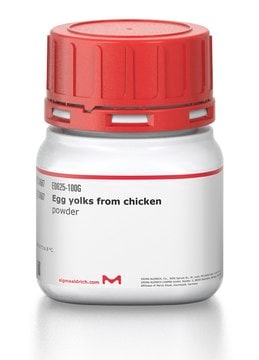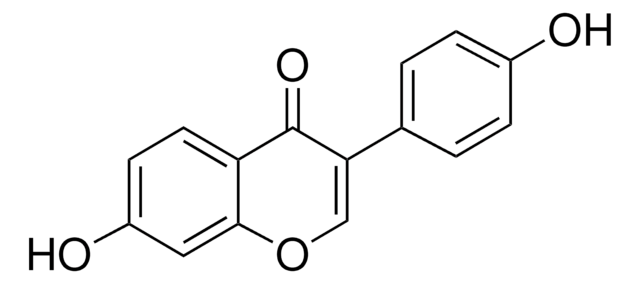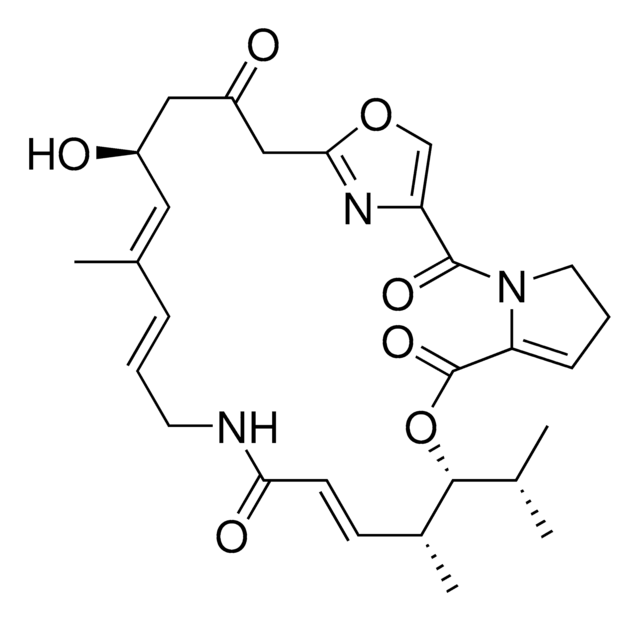Recommended Products
Looking for similar products? Visit Product Comparison Guide
General description
Phosvitin from egg yolk is a polyanionic phosphoserine rich protein. This phosphoglycoprotein comprises α-helices and β-sheets structural elements, which are poorly organized due to the presence of phosphoserine. It represents about 11% of yolk proteins and is hydrophilic.
Application
Phosvitin from egg yolk has been used:
- as a control protein for immobilization on-chip for deep purple protein staining methods for monitoring post-translation modifications
- as a substrate for casein kinase Iε in in vitro casein kinase assay
- as a standard in gel filtration chromatography (GFC) and sodium dodecyl sulfate-polyacrylamide gel electrophoresis (SDS-PAGE) for quantification of phosvitin from egg extracts
- for immobilization onto Layer-by-Layer (LbL) for Fourier transform infrared spectroscopy-attenuated total reflectance (FTIR-ATR) studies
Biochem/physiol Actions
Phosvitin fed to rats by adding egg yolk to their food resulted in decreased absorption of magnesium, iron and calcium but not of phosphorus.
Phosvitin from egg yolk is a calcium chelator and binds to iron present in the yolk. The metal-binding functionality is exploited in mineral-binding bioactive peptide production. It is a nutraceutical and has potential for phosphopeptides production.
Other Notes
A phosophoprotein containing 8-10% phosphorus. Molar N/P ratio approx. 2.7.
Storage Class Code
11 - Combustible Solids
WGK
WGK 3
Flash Point(F)
Not applicable
Flash Point(C)
Not applicable
Personal Protective Equipment
dust mask type N95 (US), Eyeshields, Gloves
Certificates of Analysis (COA)
Search for Certificates of Analysis (COA) by entering the products Lot/Batch Number. Lot and Batch Numbers can be found on a product’s label following the words ‘Lot’ or ‘Batch’.
Already Own This Product?
Find documentation for the products that you have recently purchased in the Document Library.
Kodai Yamane et al.
Fish physiology and biochemistry, 39(2), 373-390 (2012-08-25)
Elasmobranchs (sharks and rays) exhibit unique reproductive characteristics and, in contrast to the situation in teleosts, very little is known about the identity, structure and physical characteristics of their egg yolk proteins. The aims of this study were to (1)
Chen Sun et al.
Developmental and comparative immunology, 40(1), 28-34 (2013-01-12)
Lymphocystis disease virus (LCDV), a virus of Iridoviridae, can infect numerous teleost species, causing serious losses of aquaculture industry, and thus effective ways of prophylaxis and treatment are demanded. Previous studies have shown that phosvitin (Pv) is an antimicrobial agent
Shicui Zhang et al.
Developmental and comparative immunology, 39(1-2), 72-78 (2012-03-06)
Both innate and adaptive immune-relevant factors are transferred from mother to offspring in fishes. These maternally-transferred factors include IgM, lysozymes, lectin, cathelicidin and complement components. Recently, yolk proteins, phosvitin and lipovitellin, have been shown to be maternally-transferred factors, functioning in
Positional syntenic cloning and functional characterization of the mammalian circadian mutation tau.
P L Lowrey et al.
Science (New York, N.Y.), 288(5465), 483-492 (2000-04-25)
The tau mutation is a semidominant autosomal allele that dramatically shortens period length of circadian rhythms in Syrian hamsters. We report the molecular identification of the tau locus using genetically directed representational difference analysis to define a region of conserved
Bo Lei et al.
Journal of chromatography. A, 1223, 41-46 (2011-12-27)
The objective of this study was to develop a simple method of phosvitin purification from hen egg yolk without using organic solvents. Egg yolk was diluted with equal volume of water and stirred for one hour at room temperature, followed
Our team of scientists has experience in all areas of research including Life Science, Material Science, Chemical Synthesis, Chromatography, Analytical and many others.
Contact Technical Service






